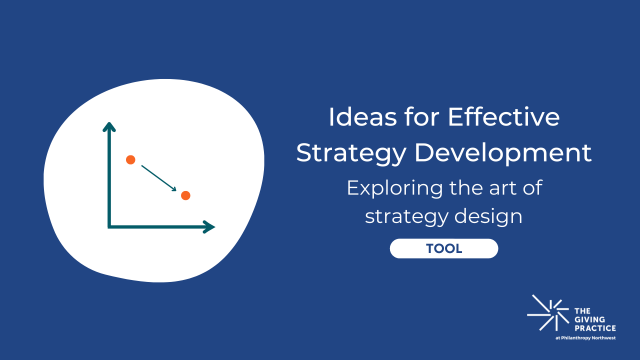
Even in the best of times, foundation leaders navigate a complex landscape. Since early March, we’ve heard from several of these leaders regarding the growing challenges they face in supporting their staff, board members and their communities under the cloud of a pandemic. It’s a lot to hold.
To support these leaders, Philanthropy Northwest (PNW) and The Giving Practice (TGP) partnered, inviting leaders from PNW’s membership to participate in a cohort we called CEO Conversations. CEOs from more than 30 foundations responded and we created cohorts of five to six CEOs who met four times over a two-month period.
During these sessions, leaders shared how they guide, learn and listen during these challenging times, while seeking insights and encouragement from one another. Their work has generated a wealth of insights, and we’ve captured some of the key takeaways below:
Work with the (Virtual) Door Open.
Leaders recognize that this moment calls for a willingness to share their vulnerabilities and challenges, regardless of their comfort level with modeling this behavior (for more on this, see the Harvard Business Review article on holding environments that we shared with cohort members).
Leaders are adapting virtual “open door” practices to better connect with increasingly stressed team members. While this requires even greater accessibility between leaders and their staff, our cohort members explained that by increasing accessibility, staff are better able to work through the challenges they face. Leaders are also creating resources to help staff manage the challenges they face by:
- Encouraging self-care and providing additional days off, allowing for flexible hours and shortening the hours in the work week.
- Providing additional help for parents with younger kids or with lack of internet connectivity.
- Helping employees who are also care-givers and/or have challenges related to going back to the office.
Every meeting, our TGP facilitators reminded these leaders that some days, just showing up is enough. As an additional resource, we provided our cohort members with this brief article: "Your Only Goal Is To Arrive."
Practice Patience and Grace.
CEOs are balancing pressures that are deeply personal and professionally demanding. Practicing patience and grace with staff, boards and most importantly with themselves, is a must right now. Grace also means being open to the different ways people are making meaning of – and processing – this time.
Grace is also about humor. Working from home amid family and pets requires us to rethink our standards of professionalism and acknowledge the moments when others are struggling with new technology, a crying child, the phone or doorbell ringing or a cat walking across the keyboard.
Model Adaptive Leadership.
All of us are learning how to lead in these unprecedented times. Our TGP facilitators asked CEOs to reflect on and name how their leadership is changing with questions like:
- How have events affected you and/or your leadership?
- What is one leadership muscle you are trying to develop in this time?
- How might we redefine leadership to become more authentic to ourselves and in relationship with the broader community?
- What would more collaborative leadership look like?
Leaders expressed the need to actively listen to their peers within the group and to incorporate ideas from their cohort into their work. They also spoke to their own “human-ness” – and to doing the best they can – in this moment. For example, one leader described how a staff member shared the ways in which anxiety was affecting their well-being during an informal check-in call, and how that leader provided space for their colleague to be heard (recognizing that a phone or zoom call might eliminate much of the casual feel associated with dropping by a colleague’s desk). Leaders also spoke to the moments when they have cried or held back tears themselves.
Recognize the Exponential Impact on Leaders of Color.
People of color in the CEO cohorts expressed a level of exhaustion they had not felt before. They described the added stress of holding even more space, and the personal pain of experiencing and facing the inequities exposed by the pandemic, from anti-Asian racism driven by misinformation about COVID-19, to the high rate of infections among Latinx communities required by law to work, to the depths of despair and anger about the killing of George Floyd and all who came before and after him. Whether these issues were raised directly in the cohorts or observed by both white and BIPOC members, cohort members expressed a commitment to reach out to leaders of color and to help relieve some of this added burden.
Embrace the Uncertainty and Recognize the Transition.
Liminality is the in-between period typically marked by uncertainty. Though liminality might seem like an abstract concept, our TGP team has found it can be a powerful tool to understand moments of transition. Embracing this liminal time can help us to better manage ambiguity and uncertainty. How can your organization move forward when so much is unclear, and the stakes are so high? How might you work with colleagues to hold space in difficult times and discover new ways forward? Embracing this opportunity to practice more intentionality and presence in “the spaces between” can help.
Express Belief in a Better Future.
One job of a leader is to hold out the hope, inspiration and excitement for what is possible. As they imagine a time where racial equity exists and we are able to move around freely again, the cohort groups found much to think about from storytelling, poetry and other writing. Here are some resources that resonated:
- "Kindness" by Naomi Shihab Nye
- "Let America be America Again" by Langston Hughes
- "Untitled [This is What was Bequeathed Us]" by Gregory Orr
- "Eagle Poem" by Joy Harjo
- Various writings by Octavia Butler
We’re grateful that these leaders participated in our cohort and shared so freely of themselves, personally and professionally. Their insights and openness have enabled us to provide the lessons we’ve shared here. In closing, we thought it would be helpful to share some of their impressions from these cohorts in their own words:
If you want to learn about future peer cohort opportunities, The Giving Practice runs annual groups for CEOs and Trustees. Please contact Sindhu Knotz for more information.


